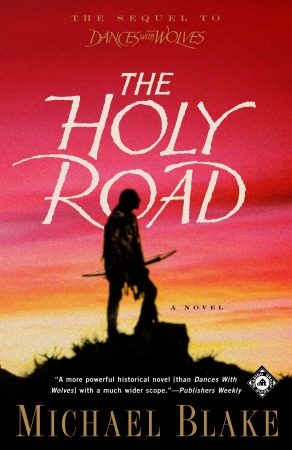By William Sugarman "nprfan1" (Great Neck, NY USA)
Michael Blake's book reads as though it was written for a junior high and high school audience. That doesn't stop it from being a well-done tale of life on the prairie in 19th-century America, although why Costner made his Indians Sioux instead of Commanche as written by Blake is beyond me.
Aside from that difference, Costner obviously followed Blake's novel almost to the letter; I felt as if I was seeing the movie all over again. But Blake's writing style is something of a disappointment. After seeing the movie I was expecting a much more detailed story of John Dunbar's transformation into Dances With Wolves--something on the order of James Clavell's "Shogun." If you picked this book up looking for information on how Native Americans lived back in their glory days I suggest you look elsewhere. But if you're looking for a well done Western this is the book for you.
Shook-mani-took-tonka Oh wachi, April 22, 2006
By Monty Rainey (New Braunfels, TX United States)
The Indians befriended by Lt. Dunbar and portrayed in the movie as Sioux, are actually Comanche. Now I can understand the alteration here, for a couple of reasons. First of all, though most Americans are notoriously ignorant of our rich history, for the most part, people do know the Comanche were the baddest of the bad and it would be an increased degree of difficulty to portray the Comanche in a positive light as being rather passive and wanting only to be left alone to live in peace. Though the Sioux were hardly any more docile, their reputation is certainly not nearly as notorious. Also, for cinematic reasons, it's certainly understandable that the domain of the northern Sioux is a more picturesque backdrop that the barren plains of the Southern Comanche. Also, the Sioux language of the movie has a more poetic feel to it and is somewhat more widely recognized than the rather obscure Shoshonean spoken by the Comanche.
Eleven years after winning an Academy Award for the film screenplay of his novel Dances with Wolves, Blake offers this dramatic sequel to his tale of army Lt. John Dunbar and his life with the Comanche Indians on the Great Plains. It is now 1874, 11 years after Dunbar deserted from the army to live among the Comanche. He has married Stands with a Fist, the captive white woman raised by Indians, and they have three children. Dunbar has forsworn the white man's ways and is accepted as Dances with Wolves, a full-fledged Comanche warrior. These are hard times for the Plains Indians, however, as the advance of the white man results in war, misery and a gloomy future. When a party of white rangers attacks his village and kidnaps his wife and youngest child, Dances with Wolves goes after them in a wild attempt at rescue. Alongside his tale of Dances with Wolves's personal turmoil, Blake more forcefully tells of the conflicts among the Indians regarding whether to fight the white man or to make peace. Raids, ambushes, atrocities and bitterness on both sides can have only one conclusion, despite an Indian peace delegation that goes to Washington, D.C., to meet the Great White Father. This novel focuses less on Dances with Wolves and much more on the confused plight of the Indians, who cannot understand the white man's greed, duplicity and brutality. Familiar characters from the original novel reappear here in more important roles, making this a more powerful historical novel with a much wider scope. Blake's ability to evoke sadness and joy, action and emotion is as strong as ever, and the ending hits hard.
I suppose they won't address the switch from Lakotas to Comanches. They'll just pretend the first movie was about Comanches. But every time someone refers to Kicking Bird or Wind in His Hair as Comanches, I bet it will stick out. That's what happens when you make ill-considered changes in the source material.
Below: A white man stands in for Indians once again.


4 comments:
Writerfella here --
Actually, both of Blake's Dunbar novels are nice, easy reads (sixth-grade easy) but both also are worlds above Charles Frazier's laggard and sluggardly mounted THIRTEEN MOONS. It is true that neither DANCES WITH WOLVES nor THE HOLY ROAD exactly scintillates with historical or Comanchean cultural details, but if one attends Blake's works looking for DUNE by Frank Herbert, one should go and read DUNE by Frank Herbert instead. And writerfella rests assured that Rob fairly is slavering for the film to be finished and released. In fact, look! He's already writing his movie review while wearing his Freddie Kruger gloves!
All Best
Russ Bates
'writerfella'
I could say something about not being surprised that you appreciate a 6th-grade-level book, but it would be rude. ;-)
Writerfella here --
'Sixth-grade' is about the highest quantifier granted by authorities to 95 per cent of writing in America today, but unfortunately most Americans do not possess that high a reading level by education. And writerfella did not say he himself possessed that low a reading level, only that he recognizes it when he reads it. Such as that which is found in most of the longer posts in this blog, per exemplum...
All Best
Russ Bates
'writerfella'
You said you appreciated a book written at a 6th-grade level over a more complex book. Perhaps you can read at a higher level, but it's not clear if you can appreciate at a higher level. Judging by your fawning over Apocalypto and Bury My Heart at Wounded Knee, your appreciation of advanced storytelling is sadly lacking.
Re "most of the longer posts in this blog, per exemplum...": You mean the longer posts written by you, presumably. Such as those in which you go on and on about your life and career as if anyone cares.
Post a Comment